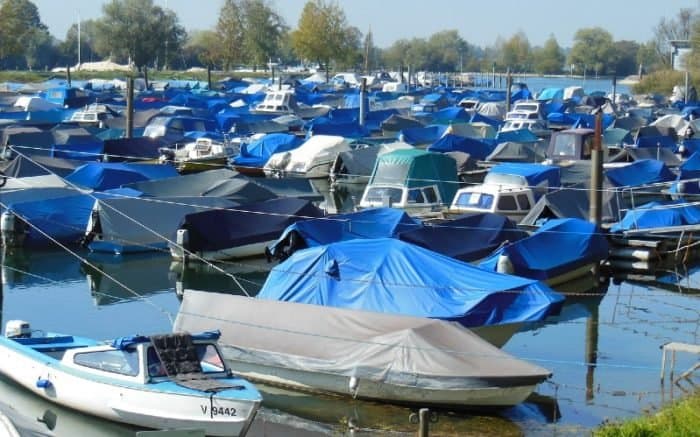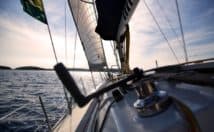Everyday Phrases and their Nautical Origins
Nautical terms and phrases have found their way into so much of our everyday speech. Though some terms make it obvious, like when you refer to something holding you back as an anchor, or maybe how a few drinks made you feel three sheets to the wind, other phrases are not. These everyday terms have become so ingrained in our lives and removed from their nautical origins, it’s not always easy to tell.
Let’s take a look at some of those old mariner terms, a few of which may seem obvious but many not so much.
AAdmiral Adrift Ahoy! Aye, Aye |
BBamboozle From the 17th century, it described the Spanish custom of hoisting false flags to deceive (bamboozle) enemies. Barge Before the mast Between the Devil and the Deep Bluejacket Black Book Blind Eye Blood Money Boat Boatswain (pronounced bo’sun) Boatswain’s Pipe Booby Hatch Boot Camp Brightwork Brought Up Short Buccaneer Bumboat By and Large In the late 17th century if you were sailing close to the line of the wind you were sailing by. Sailing with the wind on quarter meant you were sailing large. So the meaning was “alternating close-hauled and not close-hauled.” If you are sailing close hauled you are sailing into the wind, or as close as possible, while not close hauled means the wind is hitting against the widest part of the ship. To go back and forth is to go by and large. These days the term means “to consider everything” and you can see how it corresponds to the nautical term which covered everything from into the wind to not. By Guess and By God By the Boards |
D Dead Horse Deep Six Deliver a Broadside Devil to Pay Ditty Box or Ditty Bag Doldrums, In the Doldrums Down the hatch Dutch Courage EEven Keel, Keeled Over F Fall Foul Of, Foul Up Fathom Figurehead Filibuster First Rate Today this means something of high quality or value, the term originated with ship building. The largest warships that had at least 100 guns, could carry a crew of over 800 and weighed at least 2,500 tons were classified as first rate vessels. While we consider “second rate” to mean something inferior or poor quality today, it also kept with these ranking system and simply referred to a smaller class of ship that had 80 to 90 cannons, a crew of 700 to 750 and weighed up to 2,200 tons. Fits the Bill Flake, Flake Out Flotsam and Jetsam Fluky Fly-by-Night Footloose G Gripe Grog, Groggy Ground Swell H Half Seas Over Hand Over Fist Hard Up Hard and fast describes a vessel firmly aground and unable to make progress and has come ashore to mean rigid. ‘Hard up in a clinch and no knife to cut the seizing’, the term from which hard up derives, was a sailor’s way of saying he had been overtaken by misfortune and saw no way of getting clear of it. Shore-side, the term means in need. Haze Hot Chase Hotchpotch, Hodgepodge Hulk, Hulking I Idler, Idle J Junk Jury Rig K Keel Hauling Knowing the Ropes LLeewayAn amount of freedom to act or do something. In modern usage, you might say you need some leeway to finish a job or figure something out, which often means you need time or a little more freedom to accomplish the task. In its nautical origins, leeway means the sideways drifting caused by the wind against the side of the ship. The wind pushes you leeward, or downwind, forcing you to travel leeway which is slightly outside of your intended path. Long ShotWhen you use longshot today you’re referring to pressing your luck. A long shot is something unlikely and you’re going to need some luck to pull it off. The origins of the phrase come from the early days of cannons on ships. They were known to be incredibly inaccurate at a distance so if a cannon hit a target that was far afield it was a long shot, and considered lucky. Loose CannonSomeone who is unpredictable and potentially dangerous is a loose cannon. The origin of the term is literally what it sounds like. On a ship at sea, a loose cannon was not just a serious risk, it was hard to control. Ship cannons could weigh between half a ton to about two and a half tons. If one was loose and rolling with the sea, you can imagine the risk. MMainstaySomething a person or entity depends on. For instance, a bachelor may have pizza as a mainstay of their diet, while corn could be a mainstay of the farming industry in your area. In the nautical sense, the mainstay is the stay, or line, which supports the mainmast from the top to the foot. MaroonStranded on an island or other isolated place. This term has some racist history as “maroon” was a term used to refer to fugitive slaves and seems to trace its origin to a Spanish term meaning wild or feral. The act of marooning someone in a nautical sense means to abandon them on an island intentionally, although the word is now used to include when it might happen accidentally. The connection between the current usage and the historical one is related to the fact that you are lost in the wilds. MateA friend or comrade. This is an old term that dates back to the 14th century and has Germanic origins. The word originally means something like “one who eats at the same table,” which would indicate someone you trust or have closeness with. By the early 1500s this was a common term used by sailors to address one another and by the end of the century it had become a term to refer to officers on merchant vessels who carried out their captain’s orders. This meaning actually predates the other version referring to a romantic partner. NNot Enough Room to Swing a CatA small space. This phrase is not extremely common these days but it’s still in use as a colorful metaphor. Someone might use it to describe a tiny apartment, for instance. The origins are a little murky but it’s believed to have derived from naval slang. Sailors were once punished for various crimes at sea by being whipped with a small, multi-lashed whip called a cat-o-nine-tails. In a small space, such as below deck on a boat, there wouldn’t be enough room to swing such a whip, hence the term. OOff to a Flying StartStarting something very well or successfully. The idiom comes from racing sailboats as the vessels have to get underway before hitting the actual starting line. If your vessel gets a favorable wind and fills the sails you’re flying at full sails as you start, which is as good as you can hope for. On the Right TrackMoving in the right direction towards a goal or success. The phrase relates to ship navigation. Originally “on the right tack” which dates back to the 1600s with “on the right track” became a more prevalent variation in the late 1800s. Tacking a vessel involves changing its direction relative to wind, so a boat may tack starboard. If you are tacking correctly, you are heading in the right direction. Track seems to have replaced this as it’s a more common word and, to lay people, also makes more sense because track means path so the meaning ends up being the same. OverhaulTo take apart and examine thoroughly, possibly also repairing in the process. You can overhaul a car engine by removing it, taking it apart and cleaning all the parts before reassembling it. The nautical origin referred to ropes. Sailors could overhaul rope by pulling in the opposite direction it was drawn to create slack. This allowed the rope to be inspected and repaired or replaced if necessary. PPass with Flying ColorsTo succeed beyond expectations or to achieve something flawlessly. The phrase comes from the custom of ships returning from sea. If a ship returned from a victorious mission or victory, they would fly their flags fully unfurled. Flags are also referred to as colors, so flying colors if flying your flags. To pass with flying colors would be to pass into port with all flags flying in victory. Pipe DownCommonly used today as a way to tell people to keep quiet. Not as rude or absolute as “shut up,” rather to just lower your voice and settle down a bit. The term comes from the use of the boatswain’s pipes dating back to the 16th century. One of the commonly used signals sent by the pipe told sailors that it was time to head below decks and settle into bed or “pipe down.” RRide Out the StormTo wait out a dangerous situation while staying relatively safe. This comes from a literal meaning in nautical terms. Sailors at sea had little option about how to endure severe weather and, when trapped in a storm, would literally have to ride it out until the weather calmed down again. Round RobinA tournament that allows every contestant to face off against every other contestant in turn. The nautical origin of the term came from complaints being made by the crew about the captain or how the ship was being run that they wanted changed. The signers would add their names in a circle rather than in a typical top to bottom fashion so that, by the time the captain or person in charge got the document there would be no way to tell who started it so no one could be singled out as a ringleader. SShow Your True ColorsShowing your true colors means you are revealing what kind of person you really are, or what your motivations are after concealing them. The idiom comes from ships at sea which would fly false flags that identified them as perhaps being friendly. Before engaging in combat, they would switch flags (colors) and show who they truly were, such as the ship of an enemy nation or a pirate. This was seen as an especially deceitful practice. Slush FundA stash or account of money that is usually associated with something illegal or at least underhanded. Most often it’s used to refer to money involved in political bribery or shady deals. It comes from a fund of money that a ship’s crew would raise by selling something called slush. Slush was the term for the fat they scraped out of the cooking pots and sold to tallow makers. This slush fund was not part of the ship’s accounts and the crew could use it to buy small items for themselves at port. Stem the TideTry to prevent something from getting worse. Modern usage often relates to a trend of something negative, such as trying to stem the tide of drug use amongst teens or stem the tide of shoplifting. The origin of the phrase seems to refer to making headway against the tide in a vessel. There is some debate over the exact origins but there’s evidence that a nautical meaning may be the earliest. TTaken AbackIf you’re taken aback something has surprised you in the sense that things are playing out in a way you didn’t expect, rather than surprised by a jump scare in a movie, for instance. The phrase’s nautical origins refer to the sails. A sudden gust of wind would blow the sails aback against the mast or spars, flattening them out. Tide OverSomething that helps you out until things are better. In modern terms you might say having a snack will tide you over until dinner. In nautical terms, the phrase comes from Captain John Smith’s “A Sea Grammar,” which was written in 1627. If the wind had died down rendering sails useless, boats could ride the tide until the wind picked up again. Toe the LineIn the modern world, to toe the line means you are conforming to rules or doing what you’re told. The origin of the phrase seems to date back to the British Navy, however. Sailors were ordered to line up for inspection along planks on the boat’s deck. Barefoot, their toes were literally supposed to be on the line so they were all neatly in order, doing as they were told. UUnder the WeatherFeeling sick. Under the weather is a polite euphemism for feeling ill today. Its nautical origins stem from the tendency for poor weather to make some sailors feel nauseated. On rough seas caused by bad weather, the motion of the boat could cause intense seasickness. The sailors who came down with this would be sent below deck to the spot on the ship that was the most stable in an attempt to ride it out. UnfathomableSomething you cannot understand or believe. This comes from depth measuring on a ship. A fathom is about 6 feet and sailors used to use a lead line, a length of line weighted on one end and marked every 6 feet, or one fathom, to measure depth. If they were in a place in the ocean that was beyond the length of the lead line to measure it was unfathomable and therefore something they couldn’t know. Until the Bitter EndTo continue something until it’s complete, even though it will likely not be pleasant. While this seems self-explanatory, this is somewhat deceptive. Bitter, in this case, refers to something other than what we commonly imagine. The bitt on a vessel was a post or timber that lines were attached to. The bitter end of a line was the very end of the line attached to the bitt, after which there was nothing else. The word bitter now is taken to mean the adjective, something unpleasant or objectionable like the taste, and the meaning remains the same regardless. WWindfallAn unexpected win or surprise that enriches you in some way. This is a curious one because you will see it on various websites claiming its nautical origins relate to a gust of wind in the sails of a boat. There is no evidence for this being true, but it is often repeated. The true origin of windfall has a semi-nautical correlation. In reality, windfall referred to wood and fruit blown down from trees. This saved you the effort of harvesting such things and was a good thing. In a nautical sense, sailors in need of making repairs could take advantage of windfall trees much easier than chopping down new ones for timber. It’s a tenuous link, but applicable. |
Categories: nauticalknowhow












1 Comment
mb on December 17, 2021
Well done, Chris. None of that ridiculous stuff currently circulating (such as ‘raining cats and dogs’ etc). Thank you. mb